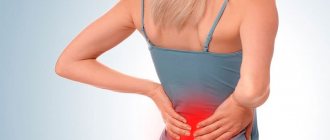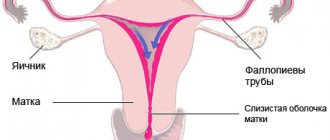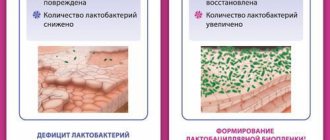Published: 09.29.2021 13:50:00 Updated: 09.29.2021
Menopause in women is the age-related decline in ovarian function and the gradual decline of childbearing function. The average age of onset of this condition is considered to be the period from 45 to 55 years, and menopause lasts 15-18 months. Changes in the body affect not only the reproductive organs, but can also lead to the development of many serious diseases. Therefore, women of the appropriate age at the first symptoms of hormonal changes are recommended to be observed by a gynecologist-endocrinologist and undergo regular diagnostic procedures.
What is menopause in women: symptoms, age, treatment of possible problems
Menopause (menopause) is a period of gradual decline in the body's reproductive function, which is caused by a decrease in the production of sex hormones. At this stage, menstrual flow (months) becomes irregular, scanty and eventually stops. This occurs due to a decrease in the production of estrogen and progesterone, depletion of the follicular reserve of the ovaries during menopause, and their atrophy, which leads to a decrease in their weight and size by almost half.
Signs of menopause (Climax), as well as the time of their first appearance, vary and are individual for each woman.
Some may complain of hot flashes, headaches, unstable blood pressure, while others may practically not notice changes in their own body, except for the cessation of menstruation, that is, this period passes without symptoms. If the symptoms of the onset of menopause cause a deterioration in a woman’s quality of life, then appropriate therapy is prescribed, which will be discussed below.
Factors influencing the duration of menopause
When the menopause occurs and how long it will last depends on many factors. Heredity, quality of life and the presence of gynecological diseases become decisive. Various infectious diseases, regular exposure to stress, and bad habits can accelerate the decline of ovarian function.
Even if you have a genetic predisposition to early menopause, you can delay this process.
Early menopause occurs in women who have a bad habit such as smoking. This is due to the negative effect of nicotine on the nervous system, which leads to oxygen deficiency in the ovarian tissues and, as a consequence, to the destruction of the follicles. There is also a risk of premature completion of menstruation if you have thyroid disease.
When do the first signs of menopause appear: the age of women
The time of onset of this period is individual for each woman and depends on a number of factors (heredity, general health, number of births in history). On average, the age at which the first symptoms of menopause appear is 50 years, but in some cases, the onset of menopause can be observed at both 40 and 60 years. The greatest intensity of menopause symptoms usually persists for a year, after which it gradually decreases and ends.
Separately, it is worth noting early menopause. Symptoms of this condition can begin as early as 28-30 years of age. If the first signs of menopause occur so early, there is a risk of developing cardiovascular diseases and osteoporosis at a young age.
Expert opinion
The onset of early menopause quite often coincides with a woman’s period of social and sexual activity. Therefore, reducing the intensity of menopause symptoms is important not only from a medical but also from a social point of view.
Obstetrician-gynecologist of the highest category Oksana Anatolyevna Gartleb
Threats of late menopause
It is important for all women to know the dangers of late menopause.
The following main threats can be identified:
- A woman may not notice that she has contracted dangerous cancer. The fact is that malignant neoplasms develop in the mammary glands, ovaries or uterus in the initial stages, practically asymptomatically. The only sign of emerging pathology is a high level of estrogen. It is precisely because of the large amount of sex hormones that a woman does not stop having periods. While a woman is happy that she does not have the unpleasant symptoms of menopause and signs of aging, the cancer disease continues to develop and moves to the next stage of development. Precious time is wasted. This is why it is so important to regularly donate blood for tumor markers and undergo examinations by a mammologist and oncologist.
- If the reason for a later menopause is taking previously aggressive medications or undergoing radiation or chemotherapy, then after reaching the age of 50, you need to regularly undergo a medical examination by a specialist who treated the disease - an oncologist, endocrinologist, etc.
- Ladies need to continue to protect themselves from unwanted pregnancy. It is very important to visit a gynecologist and select individually reliable and safe contraceptives for mature women.
As you can see, ladies who have not reached menopause at the age of 50 should regularly visit a gynecologist, mammologist and oncologist for preventive medical examinations.
It should be understood that not all women whose menopause occurs later than the norm established by doctors will develop a malignant tumor. But the probability of such a development of events is high and therefore it is important to identify any potential danger and promptly treat all diseases of the reproductive system.
The first symptoms of menopause in women aged 40-50: how does menopause begin?
Among the main signs of menopause after 40, which appear first, are the following:
- Hot flashes, sweating. Hot flashes are the first signs of menopause, which 75-85% of women experience. Hormonal changes in the body during menopause affect thermoregulation processes. As a result of changes in hormonal levels during menopause, a woman may suddenly experience bouts of fever, which usually last several minutes and go away on their own. The mechanism of their occurrence is associated with the effect of estrogens on the hypothalamus, which contains the thermoregulation center that controls the processes of retaining heat by the body. When the amount of estrogen decreases during menopause, signals are sent to the hypothalamus that the body is overheating, which results in increased sweating and dilation of peripheral blood vessels. At such moments, the woman’s face and neck turn red, beads of sweat appear on the skin, the heartbeat quickens, dizziness, nausea and weakness may be present. At the end of the attack, profuse cold sweat may appear, accompanied by trembling.
- Heart rhythm disturbances during menopause. Tachycardia during menopause is caused by a decrease in estrogen levels, which normally affects the maintenance of normal functioning of the cardiovascular system.
- Dizziness, headache. These symptoms of incipient menopause can be caused by high/low blood pressure, as well as its sudden changes.
- Forgetfulness. Changes in hormonal levels lead to a decrease in vascular tone and affect cerebral circulation, which is why women during menopause complain of memory problems.
- Unstable emotional background during menopause. A decrease in the level of estrogen and endorphins leads to tearfulness, irritability and excessive sentimentality.
- Lack of thyroid hormones (hypothyroidism). Symptoms of hypothyroidism in menopausal women include apathy, difficulty concentrating, and hair loss.
- Vaginal dryness, itching and burning in the vagina during menopause. Due to a decrease in estrogen levels, there is a decrease in the production of natural vaginal lubrication, the intensity of blood flow in the vessels of the vaginal walls decreases, and thinning of the mucosa occurs. All this leads to dryness and itching; intimacy during menopause causes painful sensations.
- Osteoporosis. Osteoporosis is one of the dangerous symptoms of menopause that can lead to bone fractures. The reason for the decrease in bone density is the gradual leaching of calcium from the body, as well as a disruption in the absorption of phosphorus and vitamin D, a lack of silicon, boron, fluorine, magnesium and manganese.
- Gaining excess weight. Weight changes are explained by a decrease in the rate of metabolic processes, an attempt to compensate adipose tissue for extragonadal synthesis of sex hormones, which is one of the characteristic symptoms of female menopause.
- Decreased skin tone. One of the functions of estrogens is to maintain the elasticity of the skin. As the production of these hormones decreases, skin tone deteriorates, resulting in wrinkles, dryness, and flaking during menopause.
- The occurrence of mastopathy and chest pain due to ongoing hormonal changes.
Literature
- Abdulkadyrova M.N. Optimization of the treatment of menopausal syndrome: author's abstract. dis. ...cand. honey. Sci. – Rostov, 2003. – 24 p.
- Physiological mechanisms of aging / ed. Chebotareva D.F. and Frolkis V.V. - L.: Nauka, 1979. - 679 p.
- Baranov V. G., Arsenyeva M. G., Raskin A. M., Rafalsky Ya. D. Physiology and pathology of menopausal women. – L.: Medicine, 1965. – 270 p.
- Petrova E. et al. The drug Femo-Klim used for menopause is the best non-hormonal solution to hormonal problems // Doctor. – 2019. – No. 1. – P. 46–48.
Author: Loginova N. A.
Reviewer: reflexologist Kurus A. N.
Problematic features of menopause in women: symptoms and treatment
In some cases, the manifestations of menopause cause a woman such a severe deterioration in her quality of life that she has to seek medical help to reduce them. Below you will find general information regarding the treatment of menopausal symptoms, but remember that treatment should be prescribed by a specialist.
Self-medication can lead to new health problems and worsening symptoms of menopause.
Treatment of hot flashes during menopause
For frequent and intense hot flashes that cause physical and emotional discomfort to a woman, menopausal hormone therapy (MHT) medications may be prescribed. They contain analogues of sex hormones - both plant and synthetic origin. More often it is a combined drug based on estrogen and progesterone, which has a protective effect on the uterus (endometrium) and mammary glands.
To achieve the best results, it is advisable to start taking hormone replacement drugs at the very beginning of menopause, when its first symptoms appear. The dosage and regimen should be drawn up by a doctor, taking into account the woman’s general health, medical history, age, TSH, FSH levels.
Despite the fact that menopausal hormone therapy can reduce the unpleasant symptoms of menopause, in some cases its prescription is impossible. We are talking about absolute contraindications to taking MHT - such as heart attack (Infarctus) and/or stroke (Insultus), deep vein thrombosis, renal or liver failure, hormone-dependent oncological diseases, autoimmune diseases.
Preparations based on phytoestrogens, for example, Climafemin Ginocomfort, act as an effective alternative to MHT. This is a dietary supplement that contains the phytoestrogen genistein, an organic substance that helps reduce hot flashes and sweating, normalizes metabolism and hormonal levels, and improves sleep quality. In addition to genistein, the product contains active ingredients such as vitamin E, coenzyme Q10 and grape seed extract. All of them have a beneficial effect on a woman’s body, helping to preserve youth and normal well-being.
Treatment of hypertension during menopause
If the symptoms of menopause are accompanied by increased blood pressure, treatment may also include taking antihypertensive drugs (diuretics and diuretics).
Normalization of psycho-emotional state
If during menopause a woman experiences serious emotional instability, even to the point of developing depressive states, she may be recommended sedatives, and in especially severe cases, antidepressants.
Therapy for osteoporosis during menopause
To combat such a symptom of menopause in women as osteoporosis, they are prescribed to take bisphosphonates, calcitonin, strontium preparations, fluoride salts, vitamin-mineral complexes and food supplements containing boron, calcium, vitamins K1 and D. During menopause, it is recommended to include foods in the diet foods rich in calcium and vitamin D (milk, hard cheese, poppy and sesame seeds, soy, nuts, fresh herbs, fish; beef and pork liver, egg yolks, fish oil, cod and halibut liver, butter).
To reduce the manifestations of osteoporosis during menopause, it is necessary to stop smoking, since tobacco helps remove calcium from the body.
Combating vaginal dryness during menopause
To solve the problem of vaginal dryness caused by the onset of menopause, you can use special intimate gels. For example, you can use the Gynocomfort moisturizing gel, which provides relief from natural vaginal secretions and eliminates itching, dryness, burning and irritation in the vagina.
This product was tested during clinical studies conducted at the Department of Dermatovenereology with the clinic of St. Petersburg State Medical University, under the leadership of Ignatovsky A.V. and Sokolovsky E.V. Clinical studies have shown that due to the components included in the gel, the use of the product helps to achieve good hydration.
Neurologist Dmitry Shubin and the appearance of menopause. Live healthy!
The mucus-like consistency of mallow extract, which is part of the product, envelops and moisturizes the mucous membrane of the vulva, has a mild soothing and anti-inflammatory effect on it. Chamomile extract has a beneficial effect on existing microcracks, promoting their speedy regeneration. Panthenol and bisabolol eliminate irritation and have antibacterial properties. Moisturizing gel "Ginocomfort" was developed by specialists from a pharmaceutical company and has the necessary certificates of conformity.
Also, during menopause, a gynecologist may recommend the use of vaginal suppositories containing herbal or synthetic analogues of sex hormones. Some folk remedies for treating crisis symptoms can also be extremely effective. But it is better to coordinate everything with your doctor.
The use of such products helps to normalize the thickness of the mucous membrane during its atrophy, enhance the formation of vaginal secretions, and maintain an optimal level of acidity.
How to eat properly to prevent hot flashes?
Nutrition plays an important role in preventing hot flashes. Sometimes women, without realizing it, provoke this unpleasant symptom by eating spicy and very hot foods, spices, and coffee. Switching to a low-fat diet will not only help reduce the frequency and intensity of hot flashes, but also improve your overall health.
Here are some specific dietary recommendations during menopause:
- It is better to replace black coffee with green tea.
- All drinks, including tea, should be drunk warm, not hot. The same goes for any dish - forget about scalding kebabs and soups if you don’t want to suffer from hot flashes later.
- In the daily diet, the share of meat food should be no more than 20%. You can replace meat protein with soy. By the way, Japanese women, whose diet contains a lot of soy rich in phytoestrogens, suffer from hot flashes much less often than women from those regions where the menu traditionally has a lot of meat.
- Add vitamin E-rich foods to your menu - whole grains, nuts, wheat germ, etc. If you find it difficult to switch to wheatgrass or eat nuts, you can choose a suitable vitamin and mineral complex with sufficient vitamin E content.
How to reduce symptoms and signs of menopause in women: useful tips
With the onset of menopause, it is recommended to adhere to the following recommendations:
- Move more, engage in feasible sports and physical exercise.
- Master breathing and relaxation techniques
- Eat right and stay hydrated.
- Exercise your brain (read, solve crosswords, learn foreign languages).
- Perform exercises that train fine motor skills.
Remember: a correct lifestyle and timely consultation with a doctor if necessary will allow you to reduce unpleasant symptoms during menopause!
Sources:
- SOFT CLIMAX. Zhexembinova R. S. // Bulletin of surgery of Kazakhstan. – 2011. – No. 4. – P.98.
- MODEL OF SPECIALIZED CARE FOR WOMEN WITH Climacteric Disorders. Kholodova L.N., Protopopova N.V., Kravchuk L.A., Sharifulin M.A. // Siberian Medical Journal (Irkutsk). – 2004. – P. 76-77.
- Guide to outpatient care in obstetrics and gynecology / ed. V. E. Radzinsky. — 2nd ed., revised. and additional - M.: GEOTAR-Media, 2014. - 944 p.
- Gynecology: textbook. for universities / ed. G.M. Savelyeva, V.G. Breusenko. — 4th ed., revised. and additional - M.: GEOTAR-Media, 2012. - 432 p. : ill.
- https://www.medicinenet.com/menopause/article.htm
- Menopausal syndrome. EAT. Vikhlyaeva // Guide to endocrine gynecology. - M.: MIA. - 1998. - P. 603-650.
- Therapy of depressive disorders in general medical practice. Dubnitskaya, E.B. A.V. Andryushchenko // Modern psychiatry. – 1998. – No. 2. – pp. 10-14.
- Menopause and perimenopausal period. R.B. Jaffe // Reproductive endocrinology. Edited by S.S.K. Yen, R.B. Jaffe. – M.: Medicine. - 1998. - T.2. – pp. 560-586.
- https://www.menopause.org/for-women/menopauseflashes/menopause-symptoms-and-treatments/are-we-there-…
- https://www.healthline.com/health/menopause/symptoms-signs
- https://nccih.nih.gov/health/menopause/menopausesymptoms
Sources
- Yoshida K., Sanada-Morimura S., Huang SH., Tokuda M. Silence of the killers: discovery of male-killing suppression in a rearing strain of the small brown planthopper, Laodelphax striatellus. // Proc Biol Sci - 2021 - Vol288 - N1943 - p.20202125; PMID:33468006
- Biddau M., Bouchut A., Major J., Saveria T., Tottey J., Oka O., van-Lith M., Jennings KE., Ovciarikova J., DeRocher A., Striepen B., Waller RF., Parsons M., Sheiner L. Two essential Thioredoxins mediate apicoplast biogenesis, protein import, and gene expression in Toxoplasma gondii. // PLoS Pathog - 2021 - Vol14 - N2 - p.e1006836; PMID:29470517
- Peckham RK., Brill R., Foster DS., Bowen AL., Leigh JA., Coffey TJ., Flynn RJ. Two distinct populations of bovine IL-17⁺ T-cells can be induced and WC1⁺IL-17⁺γδ T-cells are effective killers of protozoan parasites. // Sci Rep - 2014 - Vol4 - NNULL - p.5431; PMID:24961164
- Chhajer R., Ali N. Genetically modified organisms and visceral leishmaniasis. // Front Immunol - 2014 - Vol5 - NNULL - p.213; PMID:24860575
Popular questions
Hello, hot flashes have begun, mood changes have begun, (menopause) the uterus has been removed due to mime.
What can you take in combination with vitamins to reduce this condition? You can start taking Ginocomfort climafemin 1t once a day for 3 months to relieve vegetative storms.
Hello, burning sensation in the vagina, menopause, the doctor prescribed Levomekol ointment, what else can I use?
Hello! In your case, you can use Ginocomfort gel with mallow extract, 1 dose 1 time per day for 10 days, and then 2 times a week for a long time. This product contains herbal components, bisabolol and panthenol, which will moisturize and restore the mucous membranes of the genital tract. In the absence of contraindications, it is possible to use estriol-containing drugs, for example Ornion cream, which will be etiotropic therapy.
Hello! Surgical menopause, breast cancer in 2011. I suffer from vaginal dryness, periodic cystitis and constant vaginitis after each sexual intercourse. What prevention methods are possible? After every contact?
During menopause, you can use products that do not contain hormonal components. In the Gynocomfort line, this requirement is met by a gel with mallow extract. This will help not only moisturize the mucous membranes, but also restore elasticity and aid in regeneration. The gel can be used both before contact and as needed without a time limit.
Hello, I’m 47 years old, menopause has been going on for 5 years now, at 42 it ended and that’s it, at first I didn’t take anything, the condition worsened, hot flashes and mood swings, poor sleep. 3 years ago, on the doctor’s recommendation, I took Femoston 1/5 for a year. I took it for 1 year, felt good, stopped taking it, after all, it’s hormones, now I feel bad again. hot flashes, increased blood pressure, palpitations, poor sleep, hot flashes mainly at night and depression, tell me Ginocomfort Klimafemin could help me or should I take Femoston again?
Hello!
At this stage, you can start by taking Gynocomfort climafemin. This will improve your well-being and you will have time to conduct additional examinations before resuming menopausal hormone therapy, if necessary: pelvic ultrasound, mammography, lipid spectrum, general blood test, TSH level, consultation with a therapist and obstetrician-gynecologist, smears for flora and oncocytology. For an accurate diagnosis, contact a specialist








